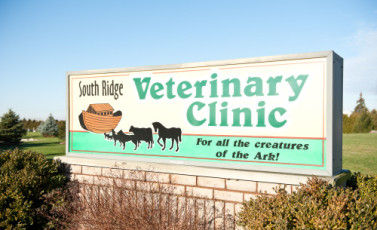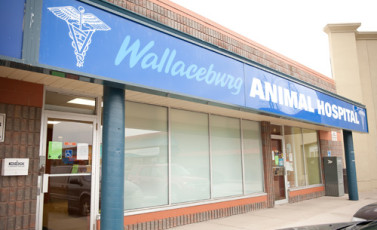Q: Why Should I Spay Or Neuter My Pet?
A: It is highly recommended that you spay or neuter your pet. Spaying is surgery that removes a female dog or cat’s uterus and ovaries. Neutering involves removing the testicles of a male dog or cat. Both of these surgeries ensure that the pet cannot reproduce. Most pets reach sexual maturity at 6 months of age. Your veterinarian can recommend the best time to spay or neuter your pet.
Key Reasons We Recommend Spaying And Neutering:
Medical – Spaying and neutering can help prevent diseases related to the reproductive tract, like life-threatening cancer and infection. Intact males can develop prostate enlargement and infection, and testicular cancer. Females that are not spayed are at risk for mammary and uterine cancer, as well as pyometra – a life-threatening infection of the uterus. Spaying and neutering can greatly decrease or eliminate the risk of these diseases.
Time & Money – Even if your pet has just one litter, a lot of care and money will be required:
• The mother needs special food and care
• Ultrasound or x-ray may be necessary to determine size of the litter
• There is a risk of emergency cesarean surgery if there are problems in birthing (emergency fee, surgery cost, hospitalization)
• Extra food and care for the litter
• Vet visits for vaccines and de-wormer before the puppies or kittens go to their new home
• Potential extra care needed if the mother rejects any babies (such as bottle feeding every 2 hours for 8 weeks)
Overpopulation – It’s a very real fact that there are not enough loving homes available to adopt all the needy pets. Humane societies, animal shelters, dog pounds, rescue foundations … they are all forced to humanely euthanize animals simply because no homes were available. Others, who are not so fortunate, die in the streets. Their deaths are not so humane: they can die from exposure to bitter winds, cold temperatures, or extreme heat; a slow starvation from being unable to scrounge enough food to survive; a painful disease that slowly weakens them until they can no longer keep going; poisoning; or outright cruelty. Please consider spaying or neutering your beloved pet.
Q: How Do I Perform Pet CPR?
A: To begin resuscitation, place your pet on its right side and ensure there is no obvious airway obstruction. Pets need approximately 80-100 compressions per minutes with 2 breaths and 15 compressions. Seek veterinary attention immediately.
Medium to Large Dogs
Breathe – Cover their nose with your mouth and use your hands to seal lips shut. This should be done once every 4-5 seconds.
Chest Compressions – Compress with interlocked fingers and straight arms over the widest part of the rib cage. You should compress the chest about 30% to be effective.
Cats and Small Dogs
Breathe – Cover their mouth and nose with your mouth. Blow air in until the chest expands and allows the pet to exhale. This should be done once every 4-5 seconds.
Chest Compressions – Place left hand over chest, behind elbow, with finger underneath, thumb on top (so sternum or breast bone is in the crook of the hand). Then squeeze, with the desired effect to massage the heart. You should compress the chest about 30% to be effective.
Q: What Special Care Should I Give My New Kitten?
A: There are few things cuter in this world than a new kitten or puppy, but they also bring with them a big responsibility. Here are some things to consider when you bring your new baby pet home:
Check-ups – Good care now will help ensure your kitten grows into a healthy, vigorous cat. Get him/her vaccinated and de-wormed at 8, 12, and 16 weeks old. Males should be neutered and females spayed around 6 months of age. All cats, even indoor cars, need to be protected with flea, tick, and heartworm prevention.
Infection protection – If other cats reside in your home, have your kitten checked for feline leukemia virus (FeLV) and feline immunodeficiency virus (FIV) before meeting the new housemates. If it’s to be an outdoor cat, have your kitten immunized for FeLV to keep him safe, too. Remember, if your cat even sits by a screened window where it can be exposed to another cat, it has the potential to catch FeLV.
Feeding – Although cats like to eat several small meals during the day, be careful about how much food you leave out. You don’t want your kitten to overeat and become obese. Try putting the food in a cute toy, he’ll knock it around to get the kibble out, staying entertained and exercised at the same time.
Litterbox – As a general rule, you should have one litterbox for every cat in your home, plus one extra box. Place the boxes where the animals have privacy, but can be reached easily. Be sure the boxes are cleaned often… for your benefit and theirs!
Q: What Special Care Should I Give My New Puppy?
A: There are few things cuter in this world than a new kitten or puppy, but they also bring with them a big responsibility. You are in for a busy time when you bring a puppy home. To ensure safety and health for your new little pet, you should consider these tips:
Feeding – You love your puppy and enjoy giving it treats, but be very careful… dogs can overeat easily and quickly become obese. Large breeds can become heavy quickly, which can cause joint problems even at a young age.
Check-ups – Regular health checks at an early age are very important for a puppy. Normally, puppies need vaccines at 8, 12, and 16 weeks. Females should be spayed and males should be neutered around 6 months. Ask about the best way to manage fleas and ticks. It is very important to not forget about monthly heart worm medication.
Socializing – We understand that you can’t wait to take your little puppy out to play with other dogs, because that is what they love to do. But resist this activity until they had her first few rounds of vaccines. Their immune system is still developing, and those vaccines take a few weeks to build immunity. Exposing them to other dogs could make her sick. Ask your veterinarian when the time is appropriate.
Q: What Kind Of Special Care Do Senior Pets Require?
A: Just as humans require more specialized tests and examinations as they age, so does your pet. Remember, because your pet ages 5-7 times faster than you (1 pet year = approx. 7 human years) that means its diseases can progress that much faster.
We recommend that all pets over 8 years of age have a physical examination every 12 months, or if they have any issues, every 6 months. Routine blood tests and examinations to search for age-related conditions such as cancer, diabetes, kidney and liver disease should be completed early to possibly prevent further damage and slow disease progression.
Q: Does My Senior Pet Need Different Food?
A: If your pet is over 8 years (human years), we may recommend a special diet suited to the breed, size, weight, etc. We also take into consideration your pet’s other specific medical conditions.
Q: What Should I Watch Out For With My Senior Pet?
A: You should closely watch your pet for changes in its behaviour. Older pets are at risk for developing Cognitive Dysfunction Syndrome (CDS), a form of senility or dementia. Phobias, fears and house soiling are also common in older pets. Physical changes to be aware of are: lumps and bumps, changes in appetite, increased water consumption, decrease in mobility and weight changes. If your older pet experiences any of these problems, there is often medical help available. Remember, older pets need more interaction and affection than adult pets.
For more information on Senior Pet Care visit www.veterinarypartner.com
Q: Should I Have My Cat Declawed?
A: When deciding whether or not to declaw your cat remember to take the cat’s personality into account. Not all cats use their claws destructively so don’t assume all need to be declawed. There are declawing alternatives such as trimming and Soft Paws™. If your cat has been declawed, it should not be allowed outside as it now has limited defense against dogs and other predators.
Q: Why Is Chocolate Bad For Dogs?
A: Chocolate toxicity is a well-known problem with dogs and cats. The active ingredients that cause the most problems are theobromine and caffeine. As the amount of toxin varies with the type of chocolate and amount ingested, signs can be mild to lethal. The clinical signs of chocolate toxicity include (but are not limited to) vomiting, diarrhea, tremors, seizures, cardiac arrhythmias and possibly death. It is important to keep candies and cookies containing chocolate away from your pets, but if they do consume some, go immediately to your veterinarian as early treatment can increase chances of a successful recovery.
Q: Giving Your Pet Human Medications?
A: Although some medications that humans use are also prescribed for animals, you should never self-prescribe for your pet. There are much safer medications made specifically for pets. You should only give your pets medications under the guidance of a veterinarian.
Q: What Is Your Privacy Policy?
A: Chatham-Kent Veterinary Professional Corporation is bound by law and professional ethics to safeguard your privacy and the confidentiality of personal information regarding you and your pet.
This includes:
- Collecting information necessary to provide high quality veterinary services.
- Keeping accurate and up-to-date records and invoicing information.
- Only disclosing personal information about you or your pet with your expressed consent, in circumstances where it is necessary and beneficial to the continued good health and welfare of your pet, or as permitted or required by law.
- Retaining and destroying personal information when no longer needed in accordance with our external regulatory bodies.
For additional facts/data, you may obtain a copy of our Privacy Policy from our Information Officer.
Q: What Is Your Payment Policy?
A: We require full payment at the time that services are rendered. For your convenience, we accept Visa, MasterCard, Debit and cash. Should you require financial assistance to cover your medical costs, Medicard is a financing company that works with our clients. For more information, visit www.medicard.com.
Surgical FAQ
We hope the following information will help you and your pet prepare for surgery. In the meantime, please don’t hesitate to call us with any questions about your pet’s procedure because each pet is different and has unique requirements.
Q: What Do I Need To Know Before My Pet’s Surgery?
A: For the safety of your pet, other hospitalized animals, and our staff we recommend that all pets that come in for surgery be current on vaccines and have had a stool check. Vaccines should be completed at least 7 days prior to surgery. We also recommend that dogs have a negative heartworm test before being anesthetized. Cats are recommended to be current on distemper and rabies at least 7 days prior to surgery.
Q: What Should I Do To Help Prepare My Pet For Surgery?
A: You will need to withhold food after 10 pm the night before surgery. Water can be left out for the pet. It is important that surgery be done on an empty stomach to reduce the risk of vomiting during (which could lead to aspiration) and after anesthesia.
Many patients that are having dental surgery start antibiotics before the procedure. Your veterinarian performing the dentistry will prescribe the antibiotics. These need to be picked up a few days before the procedure.
When you bring your pet in for surgery, we will need 10-20 minutes of your time to fill out paperwork and have a veterinary assistant or doctor talk to you about the procedure. When you pick up your pet after surgery you can also plan to spend about 10-15 minutes to review your pet’s home care needs.
Q: How Is The Safety Of My Pet Ensured While Under Anesthesia?
A: Today’s modern anesthetic monitors have made surgery much safer than in the past. We take every precaution to ensure your pet will have a safe anesthetic experience. We have a Registered Veterinary Technician helping our doctors with surgery and dental procedures. They monitor your pet’s temperature, oxygen saturation level, heart rate and other vital signs from the time your pet is anesthetized until they are fully awake.
We do a thorough physical exam on your pet before administering anesthetics. We also adjust the amount and type of anesthetic used depending on the health of your pet.
Pre-anesthetic blood (PAB) testing is important in reducing the risk of anesthesia. Pre-surgical bloodwork is recommended for every pet we perform surgery on to ensure that the liver and kidneys can process the anesthetic. Even apparently healthy animals can have serious organ system problems that could cause anesthetic or surgical complications. These problems often cannot be detected without blood testing. If serious problems are found, surgery can be postponed until the problem is addressed. PAB allows the veterinarian to customize the safest anesthetic protocol for your pet.
We also start each animal on IV fluids during the surgery. This helps keep your pet’s blood pressure normal throughout the procedure. An IV catheter already in place is also extremely beneficial should your pet experience an anesthetic emergency, which would require immediate intravenous medication.
Q: Will My Pet Have Stitches?
A: Many surgeries, especially orthopedic and tumor removals, require skin stitches. If there are skin sutures, these will usually be removed 10-14 days after surgery. Other surgeries use absorbable sutures in or underneath the skin. These will dissolve and do not need to be removed later. With either type of suture, you need to watch the incision for swelling or discharge as well as monitor whether the pet is licking or chewing at the incision. We will send your pet home with an e-collar to be worn around the neck to prevent damage to the incision from licking.
Q: How Is My Pet’s Pain Managed After Surgery?
A: Anything that causes pain in people can be expected to cause pain in animals. Pets may not show the same symptoms of pain as people do, such as whining or crying, but they feel it. This is why we ask you to keep your pet quiet for 10-14 days after surgery. We want to make sure the tissue has time to heal and no damage to the area takes place. Pain medications dispensed will depend on the surgery performed. Major procedures often require more pain relief than minor procedures. However, we always make every effort to take each individual animal’s pain tolerance into consideration when prescribing the type and duration of pain control. Animals receive pain medication prior to surgical onset to help prevent pain before it even starts.
For dogs, we may recommend an oral anti-inflammatory after surgery to lessen the risk of discomfort and swelling. We use newer medications, which are less likely to cause stomach upset. We also may use a narcotic patch for some surgeries.
Because cats do not tolerate standard pain medications such as aspirin, ibuprofen, or Tylenol, we are limited in what we can give them. Recent advances in pain medications have allowed for better pain control in cats than ever before. We administer a pain injection prior to the procedure. After surgery, pain medication is usually oral and given on a case-by-case basis. Any animal that appears to be in pain will receive additional pain medication.
Providing whatever pain relief is appropriate is a humane and caring thing to do for your pet, but also reduces stress and improves healing.
Q: What Other Decisions Do I Need To Make?
A: While your pet is under anesthesia, it is the ideal time to perform other minor procedures, such as nail trims and implanting an identification microchip. Nail trims are included free of charge for all animals having surgery. Microchips are permanent identification that can greatly facilitate the return of your pet should he or she ever get lost.



